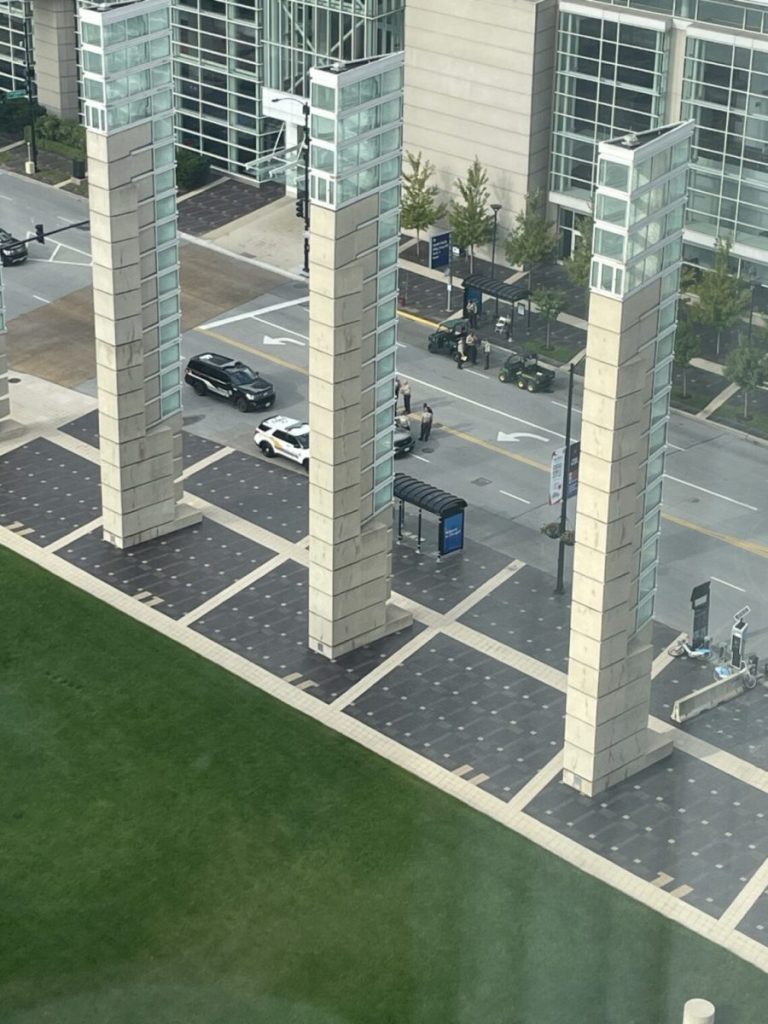By Stacy M. Brown
NNPA Senior National
Correspondent
CHICAGO – Chicago has transformed into one of the most fortified locations in the world this summer as the Windy City plays host to the Democratic National Convention (DNC). With the influx of thousands of delegates, media personnel, and political dignitaries, the city has seen unprecedented security measures involving the Secret Service and state and local police, turning downtown Chicago into a near-impenetrable fortress.
Security preparations have been visible across the city, particularly in the downtown area. To stop any attempts to vandalize the courthouse, towering security gates with concrete pillars appeared overnight at the Dirksen Federal Building in the Loop. Similarly, residents and visitors along the Magnificent Mile and Gold Coast were met with unexpected road closures and additional security barriers, even miles away from the primary DNC venues. Roads near Chicago Avenue have been blocked, with police officers stationed on standby and large security gates restricting sidewalk access.
In the South Loop, manhole covers have been sealed with tamper-evident markers, a precautionary measure to detect any unauthorized access. The DNC Public Safety Joint Information Center, which includes local and federal law enforcement agencies, has warned of additional road closures throughout the convention. Some closures will last the entire duration of the DNC, while others will be more temporary.

The security measures extend to the city’s hotels, where 15,000 media members, thousands of delegates, and volunteers are staying. These hotels have become largely inaccessible by vehicle due to barriers that include city trucks and steel walls, forcing guests to walk several blocks with their luggage. In response to security concerns, congressional officials have advised House Democrats to exercise extra caution when planning their travel, including booking lodging under different names to avoid detection. Officials have also cautioned against visiting certain areas where violent encounters may be more likely to occur.
“The protesters aren’t staying in a designated protest site… and there are people who are going to go and really try to cause trouble,” one lawmaker warned, echoing concerns about potential disruptions.
While demonstrations from Trump supporters are anticipated, the primary concern for law enforcement is the potential for violence from tens of thousands of pro-Palestinian demonstrators expected to protest U.S. funding for Israel’s war in Gaza.
In a welcome packet sent to Democratic attendees, convention officials emphasized that the Secret Service has been working closely with various law enforcement agencies, including the Capitol Police and the Chicago Police Department, to ensure the safety of the event.
High-profile speakers like Vice President Kamala Harris and Minnesota Governor Tim Walz are set to deliver speeches at the convention, and numerous dignitaries, including President Joe Biden, former Presidents Barack Obama and Bill Clinton, and former First Ladies Michelle Obama and Hillary Clinton, are expected to attend. The rumor mill is abuzz with speculation that celebrities like Beyoncé and Taylor Swift might make surprise appearances.
Monday marked the first of a week-long briefing at the Office of Emergency Management and Communications, where the Secret Service coordinates the efforts of federal, state, and local agencies. The office is also responsible for disseminating information if any unplanned situations arise.
As the first wave of protests swept through downtown, Chicago Police responded with a robust presence, including shoulder-to-shoulder patrol officers and bike units along the protest routes. Federal dog teams screened vehicles at the United Center, and U.S. Coast Guard teams patrolled the lakefront. Chicago Police Superintendent Larry Snelling assured the public that the city is prepared to handle any situation.
“We want people to exercise their First Amendment rights,” Snelling stated. “We will protect them while they’re doing it, but we will not guarantee that we’re not going to make arrests if they start to act violently or commit crimes.”




